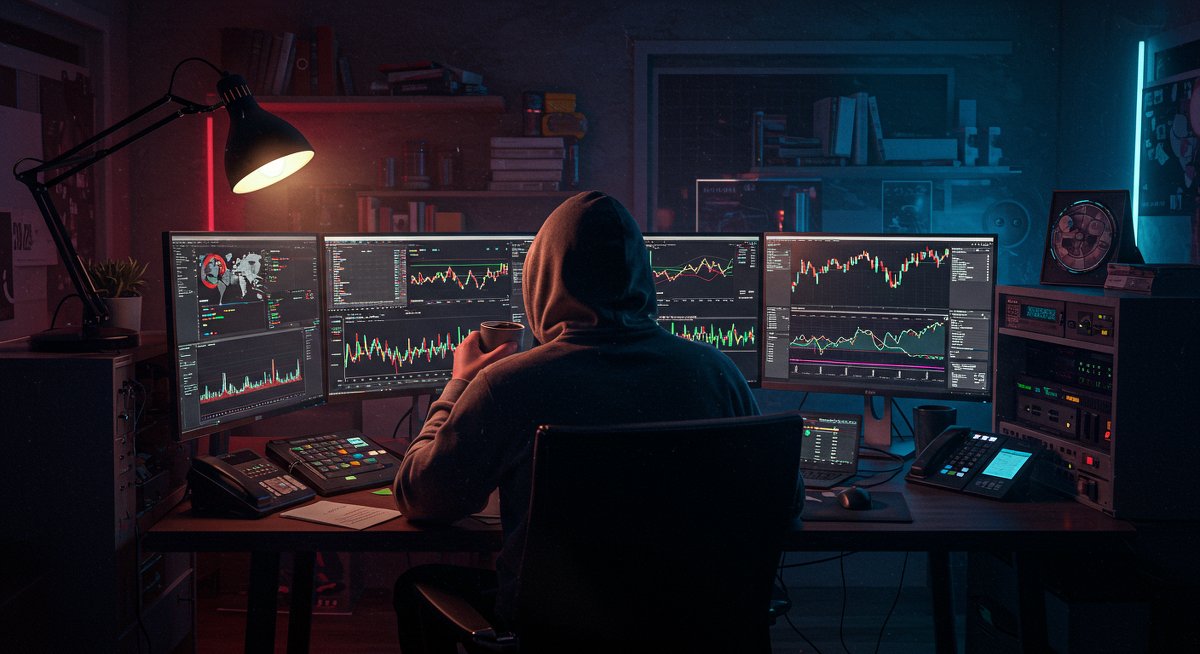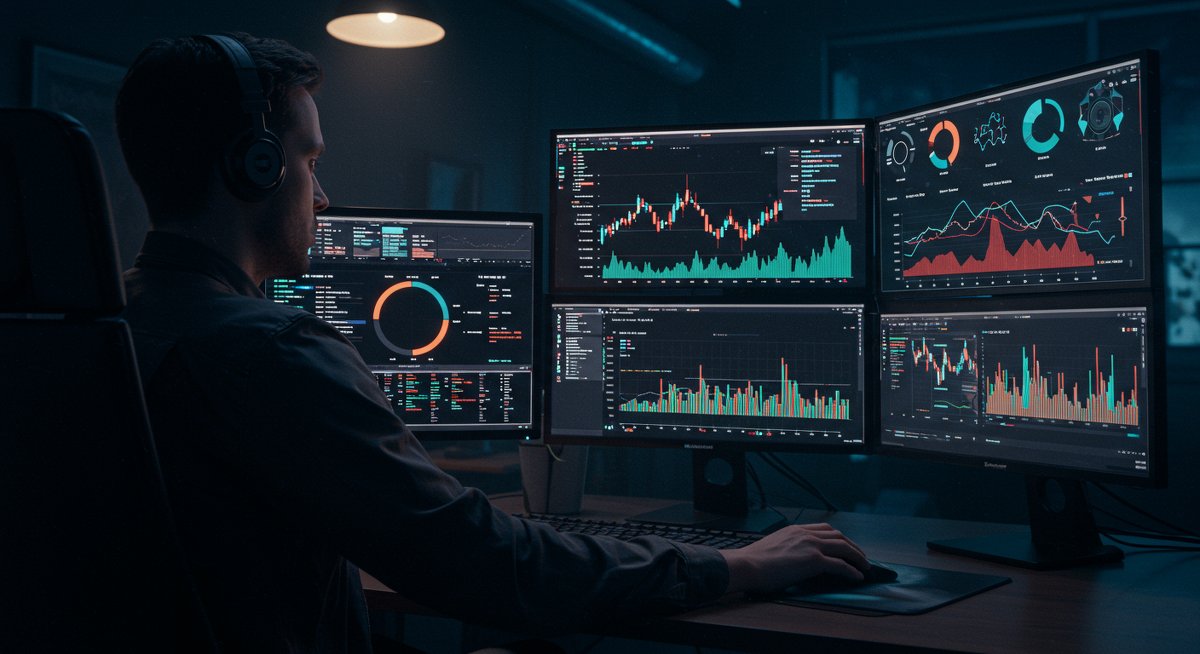Something Caught My Eye on Reddit...
So, I was browsing r/CryptoMoonShots the other day, and a post about Gordon AI (GAAI) popped up that really made me stop scrolling. It was all about this new Solana project using AI to rank community-sourced crypto token calls and then trading with treasury funds. Honestly, the idea sounded pretty wild and instantly grabbed my attention.

The post highlighted a few key things: the AI ranking system, the community aspect, and the transparent trading. Now, I've seen my fair share of "revolutionary" crypto projects come and go, especially on Solana, so I approached this with a healthy dose of skepticism. But the comments were surprisingly positive, and the project seemed to have some real traction, with claims of strong volume and price action. So, I figured it was worth digging a little deeper to see what's actually going on. Is this just another flash in the pan, or is there something genuinely innovative happening here? That's what I wanted to find out, and that's what I'll cover in this article.
What's the Deal with Gordon AI?
Okay, so let's break down what Gordon AI is actually trying to do. The core concept is pretty straightforward: they're leveraging AI to try and find promising crypto tokens early. The process goes something like this: anyone can submit potential token calls through their Telegram group. The AI then analyzes these submissions, looking at factors like the credibility of the source, the overall sentiment surrounding the token, and any historical data it can find. Based on this analysis, the AI ranks the tokens, and the project's team then uses real capital from their treasury to trade the highest-ranked ones. If a trade is successful, a portion of the profits is used to buy back GAAI tokens and reward the original contributor who submitted the winning call.
That's the theory, at least. What I found interesting is the emphasis on transparency. They claim to have a public leaderboard showing the performance of different token calls, as well as detailed reports on each token. Plus, the team is supposedly doxxed, meaning their identities are public, which adds a layer of accountability. Now, none of this guarantees success, of course, but it does suggest that they're trying to build something more sustainable than your average meme coin. However, the world of crypto is fraught with risk and potential scams. So, before jumping in headfirst, let's dive a little deeper.
Is This Hype or Something Real?
Alright, here's where we get to the meat of the matter: what does this actually mean for you and anyone interested in crypto trading? I have to say, the allure of AI-driven crypto trading is strong. The idea that a machine can sift through the noise and identify winning tokens more efficiently than a human is appealing. But it's also important to stay grounded and realistic.
In my experience, anything that promises easy riches in crypto should be viewed with extreme caution. The market is volatile, unpredictable, and full of scams. No AI, no matter how sophisticated, can perfectly predict the future. However, there are potential benefits to a system like Gordon AI. If their AI algorithm is genuinely effective at identifying promising tokens, it could provide an edge for traders. The community-sourced aspect is also interesting. By tapping into the collective knowledge and insights of a large group of people, they might be able to uncover opportunities that would otherwise be missed. Plus, the rewards system for successful contributors could incentivize more people to participate and share their best ideas.
But again, let's not get carried away. The success of Gordon AI depends on a lot of factors, including the quality of their AI, the size and engagement of their community, and the overall market conditions. So, if you're thinking about getting involved, do your homework and don't invest more than you can afford to lose.
The Stuff Nobody Talks About: The Risks
Let's get real about the risks involved, because nobody likes to talk about that part, right? It's easy to get caught up in the hype and excitement of a new project, but it's crucial to understand the potential downsides. First and foremost, remember that this is still a very new and experimental project. There's no guarantee that their AI algorithm will continue to be effective in the long run. Market conditions change, new tokens emerge, and the AI might need to be constantly updated and refined to stay ahead of the curve.
Liquidity is another important factor to consider. If the liquidity of GAAI is low, it could be difficult to buy or sell large amounts of the token without significantly impacting the price. This could be especially problematic during periods of high volatility. Smart contract risk is another thing to be mindful of. Even if the team is doxxed and transparent, there's always a chance that there could be vulnerabilities in the smart contracts that govern the project. These vulnerabilities could be exploited by hackers, leading to a loss of funds. Finally, regulatory risk is something that all crypto traders need to be aware of. The regulatory landscape for crypto is constantly evolving, and there's always a chance that new regulations could negatively impact the project or the value of GAAI.
So, before you invest any money, take the time to understand these risks and make sure you're comfortable with them. Crypto trading is inherently risky, and it's important to approach it with a clear head and a solid risk management strategy. Don't go betting your life savings on a project that is this young.
Trading Gordon AI from Outside the US
If you're trading crypto from outside the United States, there are a few additional things to keep in mind. Tax implications can vary widely depending on your country of residence. Some countries have very strict rules and regulations regarding crypto trading, while others are more lenient. It's important to research the specific laws in your jurisdiction and make sure you're complying with all applicable requirements.
Access to crypto exchanges and platforms can also vary depending on your location. Some exchanges may not be available in certain countries due to regulatory restrictions. Currency conversion fees are another thing to consider. If you're trading crypto in a currency other than your local currency, you'll likely have to pay conversion fees. Finally, cultural differences can also play a role in crypto trading. What might be considered acceptable or ethical in one country might not be in another.

As an example, regulations in Europe via MiCA are very strict. The same goes for many countries in Asia, as there have been crackdowns in places like China. It's important to check what your local jurisdiction says about crypto-assets and how that might impact your ability to trade them. Remember to consult with a qualified financial advisor who is familiar with the crypto regulations in your country. They can provide personalized advice based on your specific circumstances.
Actually Doing This Stuff: Getting Started
So, you've done your research, you understand the risks, and you're still interested in exploring Gordon AI? Okay, here's a quick rundown of how you might actually go about getting started, but please, this is not financial advice. Always do your own research. First, you'll need to acquire some Solana (SOL), as Gordon AI runs on the Solana blockchain. You can typically buy SOL on major crypto exchanges like KuCoin or Changelly. Once you have SOL, you'll need a Solana-compatible wallet like Phantom or Solflare. These wallets allow you to store and manage your SOL tokens and interact with decentralized applications (dApps) on the Solana network.
Next, you'll need to connect your wallet to the Gordon AI platform. Once your wallet is connected, you can then buy GAAI tokens. Before you buy, make sure you understand the current price, market cap, and trading volume of GAAI. You should also set a clear budget for how much you're willing to invest. Once you've purchased GAAI, you can then start participating in the Gordon AI ecosystem by submitting token calls through their Telegram group and tracking the performance of the AI algorithm. Always be sure to use the official links provided by the team to avoid scams. This includes the Telegram group and the contract address, so you can be sure that you are in the right place.
My Take on All This: Proceed with Caution
Here's my final take on Gordon AI. I think it's an interesting and innovative project with the potential to disrupt the crypto trading space. The use of AI to rank token calls is a unique approach, and the community-sourced aspect could provide a valuable edge. However, it's also important to remember that this is still a very new and experimental project. There are significant risks involved, and there's no guarantee of success.
Personally, I'm going to keep a close eye on Gordon AI and see how it develops over time. I'm not going to invest any money in it right now, but I'm definitely curious to see if their AI algorithm can consistently identify winning tokens. If you're thinking about getting involved, I would strongly advise you to proceed with caution. Do your own research, understand the risks, and don't invest more than you can afford to lose. Crypto trading is a high-risk, high-reward activity, and it's important to approach it with a clear head and a solid strategy. Maybe I'm wrong, and Gordon AI will be the next big thing, but either way, I think that it is important to stay vigilant.